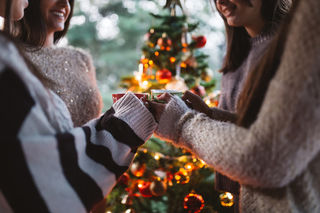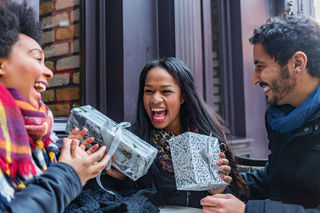Friends
How to Be a Good Friend
Social connection is essential to our wellbeing, especially this time of year.
Posted December 21, 2017

I’ve spent the last year talking to all manner of scientists—from neuroscientists to primatologists—about the biology and evolution of friendship, the subject of my next book. That book won’t be published until 2019, but in honor of the holiday season, here are five takeaways from my research that seem particularly relevant.
Prioritize the people who matter most.
Being connected is good for our health. It has a positive effect on everything from blood pressure to sleep, and those of us with the strongest social bonds live longer. But not every relationship has equal power—it’s the quality of a bond that matters most. A good friendship is, by definition, a quality relationship—a connection that is long-lasting, positive, and cooperative. Family and romantic partners might fit that definition, but they might not. We should prioritize the people who are reliable and make us feel good.

Time is a Resource. Use it Wisely.
To do lists are long this time of year, with holiday preparations added to the usual chores and work. But the more time we spend with our friends—talking, sharing a meal, going to a movie—the closer we usually are. Frequency of contact matters. Monkeys, for example, spend as much as 20% of their waking hours grooming their closest allies because that’s how they bond, building and maintaining relationships they can count when a leopard or lion shows up. We should do the same, making sure we allow time to connect and strengthen our friendships.
Laughter and storytelling bring us together.
Just as monkeys have grooming, we have ways of spending time that bring us closer together. The proof is in our hormones. When we laugh, tell stories or sing together, it triggers a cascade of endorphins that give us a mild high. We feel relaxed and contented and rewarded by the people we’re with. Studies have even shown that laughing increases our pain threshold. This biological response to social activities reinforces and rewards our desire for connection. Caroling, anyone?

Give gifts that have meaning.
In an anthropological survey of friendship across cultures, gift giving ranked as one of the four most common elements of such relationships. The lesson is not, however, that we need to impress with flash or expense, but that gift giving serves as an expression of affection and goodwill. Among a series of islanders living off the coast of New Guinea, for example, gifts of shell jewelry traveled almost literally in circles, as items got passed from person to person—the epitome of what we cynically call “re-gifting” in American society. Yet the point is not the economic value of the gifts, but the act of the giving, which reinforced trust and connection.
Remember the lonely among us.
Friendship is powerful in part because it’s the antidote to loneliness, which is downright toxic. To expand on what I wrote above, loneliness leads to increased mortality, depression, aggressiveness and stress, as well as social withdrawal, poorer sleep and elevated blood pressure. To neuroscientists, loneliness doesn’t just mean social isolation—we each have our own internal thermostat for how much social engagement we crave. (That said, I take issue with those who say they don’t need friends. Everyone needs at least one.) Loneliness, to those who study it, means the perception of a lack of social connection, which sends the brain into self-preservation mode. It is possible to feel lonely in a crowd. Moreover, more and more people in our society do live alone, especially the elderly, so isolation is a factor. While keeping in mind lessons one and two—prioritizing and using time wisely—and not oversimplifying what it takes to help people feel more connected, we could each take a moment to do something thoughtful for a neighbor who lives alone or someone else we suspect might be a little lonely this holiday season. If you do go caroling, for instance, make sure to ring every doorbell.
Happy holidays everyone. I wish you all a "connected" holiday season and I look forward to sharing more with you in 2018.


